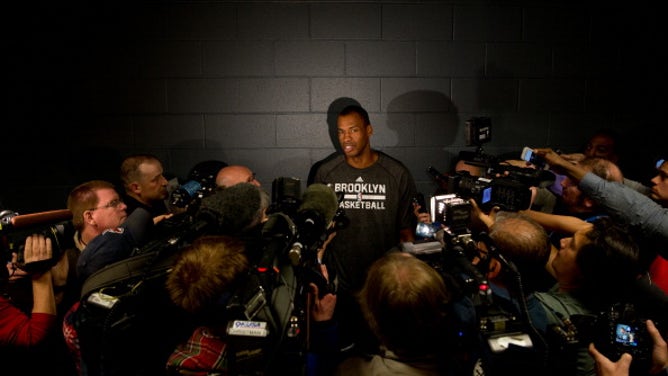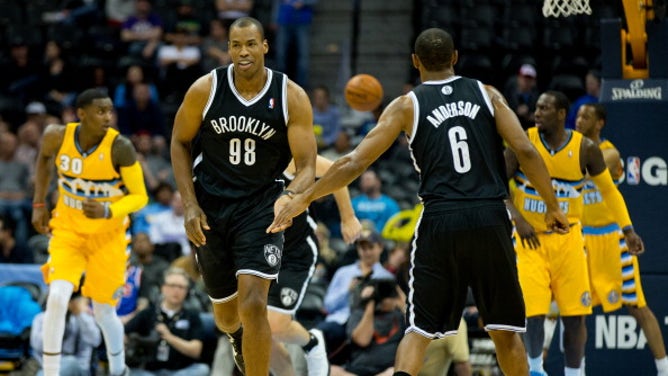Jason Collins, NBA's First Openly Gay Player, Says Religion Shouldn't Be A Reason To Skip Pride Events
On the 10th anniversary since he made headlines as the first openly gay NBA player, Jason Collins remarked on the current state of LGBT representation in sports.
The ex-NBA center, highlighted by The Athletic on Collins' anniversary, questioned religion as an "excuse" not to celebrate Pride events. He addressed a streak of NHL players who have opted out of Pride festivities, citing their beliefs.
Jason Collins Wants To See More Gay Athletes; NHL Players Are Wrong For Refusing Pride
Philadelphia Flyers' Ivan Provorov was the first player this season to not participate in his team’s Pride festivities. Provorov cited his Russian Orthodox beliefs.
READ: PK SUBBAN SAYS ATHLETES ‘DON’T NEED TO BE ACTIVISTS’ AS NHL PRIDE NIGHT DEBATE CONTINUES

Jason Collins #98 of the Brooklyn Nets speaks with the media prior to a game against the Denver Nuggets at Pepsi Center on February 27, 2014 in Denver, Colorado. (Photo by Justin Edmonds/Getty Images)
Collins reacted to the NHL players' respective decisions. "Religion should not be a cause for division, to justify any kind of inequality or to not be able to accept someone for who they are."
He then shared a story about coming out to his religious grandmother and how her reaction set a precedent — for Collins — regarding how religious people should respond to celebrating Pride. Just leave the doctrine part out, and all's well.
Collins said, "When I came out to my grandmother – and she was the family member I was most nervous to come out to – she said, ‘Baby, it’s about love.’ She said, ‘Jesus taught me to love.’ It’s about bringing people together. That’s what I think religion should be about. It’s unfortunate when people aren’t that way and try to use religion as a way to divide."

Jason Collins #98 of the Brooklyn Nets celebrates after making a basket with teammate Alan Anderson #6. (Photo by Justin Edmonds/Getty Images)
Collins Misses The Mark On Religion's Impact On Decisions
The interview hailed Collins' point against religion in a positive light. His definition of "acceptance" was considered superior to those with religious beliefs.
For Collins, acceptance must mean promotion. Frankly, anything outside of promoting one's lifestyle can be seen as inhuman as a human rights violation.
Ever since his major announcement, plastered on the May 2013 edition of Sports Illustrated, Collins has been an outspoken advocate for LGBT rights. He has also encouraged more athletes to come out of the closet.
By imposing his idea of acceptance and love, Collins negates all the different forms it takes across different beliefs.
And more conflict tends to ensue when Collins' standard is applied across society. It's not always acceptance of LGBT rights as much as coercion.
In his interview, the 44-year-old ignored the vitriol that NHL players were met with for not "wearing the ribbon" about Pride events.
Several players opted out of participating in Pride festivities. Florida Panthers' Marc and Eric Staal decided not to participate. Players from the Minnesota Wild, New York Islanders, and New York Rangers joined Provorov and the Staals in their defiant stances.
One NHL Network analyst said Provorov was better off fighting in the war between Russia and Ukraine than playing in the league and spreading his beliefs.
Religion Holds More Forgiving Standard For People Than Jason Collins' Idea of Acceptance
In the same vein, Collins doesn't count progress for LGBT in America until he sees more people come out. So unless more people come out in sports, it's a homophobic space for queer athletes.
"I think for male athletes, it’s still (like it was)," Collins said. "When female athletes come out, everyone is like, 'OK, cool, go in.' But we’re still not there yet.
"We need more and more male athletes to step forward so that we can get to that day when after the game is over, everyone’s significant other is in the family room waiting for them along with everybody else’s, regardless of gender. We still have work to do with regard to male athletes."
As the sanctity of religion continues to backslide in the United States, criticisms such as Jason Collins' become the standard; as a byproduct, events like Pride become mandatory observances to reflect good character. If you don't participate, don't expect to be treated humanely.
Whereas in religion — at least the Abrahamic monotheistic faiths — forgiveness and love are available to all.